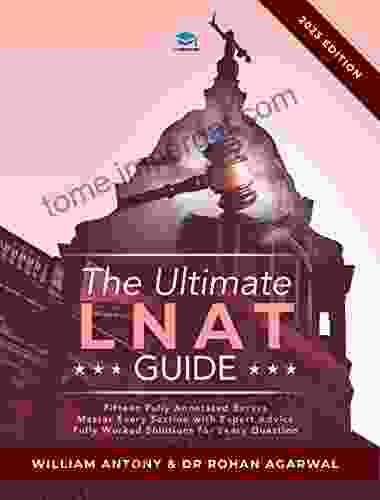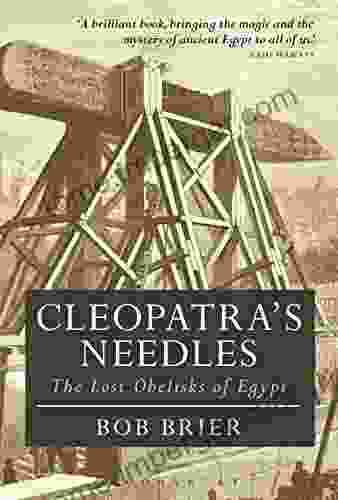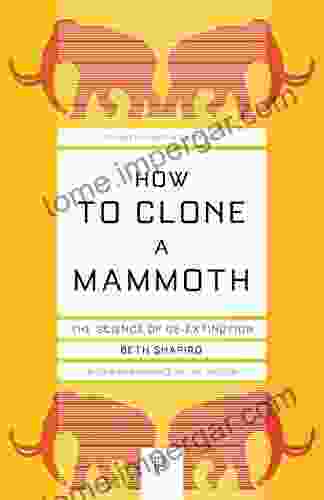The Science of De-Extinction: Exploring the Frontiers of Biology

4.6 out of 5
Imagine a world where dinosaurs roamed the Earth once more, where the saber-toothed cat stalked its prey, and the woolly mammoth grazed the icy tundra. This may seem like a scene from a science fiction movie, but advancements in the field of de-extinction are making these possibilities more tangible than ever before. De-extinction is the science of bringing extinct species back to life. Driven by breakthroughs in genetic engineering and assisted reproductive technologies, scientists are embarking on ambitious projects to restore lost species and heal the damage done to our planet's ecosystems. In "The Science of De-Extinction" (Princeton Science Library 108),we delve into the fascinating and complex world of de-extinction. Author and award-winning science journalist Ed Yong presents an accessible and comprehensive overview of this rapidly evolving field. De-extinction raises profound ethical questions that challenge our relationship with nature and our responsibility to protect it. Yong explores these ethical dilemmas in depth, examining the potential benefits and risks of bringing extinct species back to life. On the one hand, de-extinction offers the possibility of restoring lost biodiversity, correcting the ecological imbalances caused by human activities, and even mitigating the effects of climate change. Extinct species may hold genetic traits that can enhance the resilience of modern ecosystems, providing valuable tools for nature conservation. On the other hand, there are concerns about the unintended consequences of altering the natural balance of ecosystems. Introducing extinct species into modern-day environments could disrupt ecological relationships, compete with native species for resources, or potentially carry diseases that threaten existing wildlife. Yong argues for a careful and ethical approach to de-extinction, emphasizing the importance of thorough research, public transparency, and international collaboration. De-extinction is a technologically complex endeavor that requires overcoming numerous scientific challenges. Yong provides a clear and engaging account of the cutting-edge techniques and advancements that scientists are employing to make de-extinction a reality. One of the key challenges lies in obtaining genetic material from extinct species. Scientists extract ancient DNA from fossils or preserved specimens, but these samples are often fragmented and degraded. Through advances in DNA sequencing and genetic engineering, researchers can now reconstruct extinct genomes and create viable embryos. Another challenge is the selection of surrogate species to carry the embryos to term. For example, researchers have successfully produced woolly mammoth hybrids by inserting mammoth DNA into the genome of modern elephants. However, finding suitable surrogates for species that have been extinct for millions of years remains a formidable task. Yong highlights the ongoing research and collaborations between scientists, conservationists, and ethicists to develop innovative and responsible approaches to de-extinction. The potential ecological implications of de-extinction are both exciting and unsettling. Yong explores the complex interactions between extinct species, modern ecosystems, and the role of humans as stewards of the planet. Reintroducing extinct species could have significant impacts on the structure and function of ecosystems. Extinct species may fill vacant ecological niches, restore lost food webs, or regulate populations of other species. However, it is crucial to understand and mitigate potential disruptions to existing ecosystems. De-extinction also challenges our traditional views of conservation and restoration. Should we focus on preserving modern species or prioritize bringing back extinct ones? Yong argues for a balanced approach that values both the preservation of extant species and the restoration of lost ecosystems. "The Science of De-Extinction" is a timely and thought-provoking exploration of the scientific, ethical, and ecological implications of bringing extinct species back to life. Yong provides a nuanced and well-researched account of a field that is rapidly evolving and has the potential to reshape our relationship with nature. Ultimately, the decision of whether or not to pursue de-extinction is a complex one that requires careful consideration of the potential benefits and risks. Yong's book empowers readers with the knowledge to engage in informed discussions and make responsible choices about the future of our planet. Ethical Considerations: Weighing the Risks and Benefits
Technological Challenges: Overcoming the Hurdles
Ecological Implications: Rethinking Our Relationship with Nature
: The Future of De-Extinction
Book Information:
4.6 out of 5
Do you want to contribute by writing guest posts on this blog?
Please contact us and send us a resume of previous articles that you have written.
 Book
Book Novel
Novel Page
Page Chapter
Chapter Text
Text Story
Story Genre
Genre Reader
Reader Library
Library Paperback
Paperback E-book
E-book Magazine
Magazine Newspaper
Newspaper Paragraph
Paragraph Sentence
Sentence Bookmark
Bookmark Shelf
Shelf Glossary
Glossary Bibliography
Bibliography Foreword
Foreword Preface
Preface Synopsis
Synopsis Annotation
Annotation Footnote
Footnote Manuscript
Manuscript Scroll
Scroll Codex
Codex Tome
Tome Bestseller
Bestseller Classics
Classics Library card
Library card Narrative
Narrative Biography
Biography Autobiography
Autobiography Memoir
Memoir Reference
Reference Encyclopedia
Encyclopedia Beth Banning
Beth Banning Bernard H Shulman
Bernard H Shulman David Hair
David Hair Hans Lukas Kieser
Hans Lukas Kieser Barry Mcdonagh
Barry Mcdonagh Barry Singer
Barry Singer Bernard M Patten
Bernard M Patten Ben Macintyre
Ben Macintyre Robert Zubrin
Robert Zubrin Bedros Haroian
Bedros Haroian Dm Tripson
Dm Tripson Barbara J Hunt
Barbara J Hunt Marc Ribot
Marc Ribot Refael Hassin
Refael Hassin Barbara Symons
Barbara Symons Bart Raeymaekers
Bart Raeymaekers Ben Greenfield
Ben Greenfield Blake K Holman
Blake K Holman Ramez Naam
Ramez Naam Bernard Lefkowitz
Bernard Lefkowitz
Light bulbAdvertise smarter! Our strategic ad space ensures maximum exposure. Reserve your spot today!

 D'Angelo CarterUnlock Exam Success: 400+ Practice Questions with Foolproof Time-Saving...
D'Angelo CarterUnlock Exam Success: 400+ Practice Questions with Foolproof Time-Saving...
 Isaiah PowellHaunted Mohawk Valley: Uncover the Spine-Tingling Secrets of a Historic Haunt
Isaiah PowellHaunted Mohawk Valley: Uncover the Spine-Tingling Secrets of a Historic Haunt Abe MitchellFollow ·10.5k
Abe MitchellFollow ·10.5k Salman RushdieFollow ·18.5k
Salman RushdieFollow ·18.5k David BaldacciFollow ·16.9k
David BaldacciFollow ·16.9k Bob CooperFollow ·15.4k
Bob CooperFollow ·15.4k E.M. ForsterFollow ·16.9k
E.M. ForsterFollow ·16.9k Dan HendersonFollow ·19k
Dan HendersonFollow ·19k Christian CarterFollow ·12.5k
Christian CarterFollow ·12.5k Jett PowellFollow ·5.2k
Jett PowellFollow ·5.2k

 Edison Mitchell
Edison MitchellFrench Strategy and Operations in the Great War
An In-Depth Examination of Military Genius ...

 Harvey Hughes
Harvey HughesArts In Health: Designing And Researching Interventions
Delving into the...

 Walt Whitman
Walt WhitmanHealing and Hope for Those with Empty Arms
A Comprehensive Guide for Grieving...

 DeShawn Powell
DeShawn PowellUniversity of Maine Ice Hockey: A Legacy of Frozen Glory
Nestled in the heart of Maine, a state...

 George Hayes
George HayesControl For Aluminum Production And Other Processing...
In today's competitive manufacturing...

 Ben Hayes
Ben HayesThe Lost Obelisks Of Egypt: A Journey into the Depths of...
: The Enduring Allure of Egypt's Ancient...
4.6 out of 5








